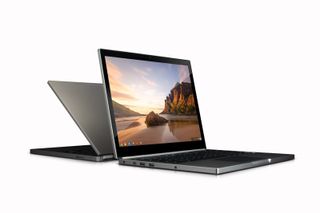MIPS-Powered Chromebooks Are Coming

We've had x86 Chromebooks and we've had ARM Chromebooks, but soon we may see Chrome OS work on yet another architecture: MIPS. The MIPS architecture, now owned by Imagination Technologies, appears to be supported in Chrome OS in some recent improvements made to Coreboot. Coreboot is Google's open source and lightweight alternative to the proprietary BIOS firmware we see in most computers.
The improvements done to Coreboot for the MIPS architecture mentioned the Pistachio SoC, which comes with a dual-core InterAptiv CPU. These improvements were written by Ionela Voinescu, who works at Imagination. Right now, we only have an indication of support for the InterAptiv core, which is one of Imagination's mid-range CPU lines. So far, Imagination has focused on selling its MIPS CPU designs to the lower end of the market. That's where the company has a better chance to make an entrance and displace a competing ARM CPU by undercutting it on price, on performance/price, or performance/die area.
MIPS Technologies, the company behind the MIPS architecture, had claimed for a long time that MIPS chips are higher performance for the same die area when built on the same process node. That may work in theory, but in practice, MIPS chips usually arrive on old process nodes, which removes their performance advantage. However, Imagination's partners, who build MIPS CPUs, can still use the lower-cost argument against the ARM chip competition.
Chrome OS, being a (mostly) architecture-agnostic operating system, can work on x86, ARM or MIPS chips. Although Google itself has mainly pushed Intel's x86 chips in Chromebooks, the company may finally be more willing to promote ARM or MIPS Chromebooks, as well. Intel already dominates the Chromebook market, and Google probably doesn't want a single company to hold a chip monopoly on Chromebooks.
Chrome OS can do one thing very well, which is run the browser -- very fast. That means it should be able to run well enough even on mid-range mobile hardware, such as Imagination's InterAptiv CPUs.
Imagination hasn't yet announced the next generation of its high-end MIPS64-based CPU cores for mobile, which could also be used for higher-performance Chromebooks. Those CPUs should offer better competition to ARM's Cortex A57 or Qualcomm's Kryos core. Just how much competition will also depend on the process node Imagination's partners will use.
Follow us @tomshardware, on Facebook and on Google+.
Stay On the Cutting Edge: Get the Tom's Hardware Newsletter
Get Tom's Hardware's best news and in-depth reviews, straight to your inbox.

Ubisoft quietly launches blockchain RPG with playable NFTs priced up to $63K

UALink Consortium poised to compete with Nvidia's NVLink — AMD and Intel-led group opens doors to contributor members

Google now uses AI to write 25% of its new code — Alphabet CEO Sundar Pichai underlines the company's role in the AI industry amidst strong Q3 24 financials
-
canadianvice ReplyCool, I didn't know that architecture existed.
I've been programming it for the last term in a computer science class. It's pretty neat - and not actually super hard machine code either. -
alextheblue ReplyCool, I didn't know that architecture existed.
Kids these days... next you'll be telling me you've never heard of Motorola's 68K chips or the Super Hitachi (SH) architecture. -
edwd2 ReplyCool, I didn't know that architecture existed.
It's widely used in microarchitecture classes, the (32bit) instructions are easy to decode and implement, and it is typically used to demonstrate the classic 5-stage pipeline. Actually, I'm working on an out-of-order core right now. -
CloudStrata BTW, look there if you want to hack the chinese. http://en.wikipedia.org/wiki/LoongsonReply -
PancakePuppy ReplyCool, I didn't know that architecture existed.
MIPS is in a lot of stuff. Your internet router is probably MIPS-based. Very popular in networking applications. The Nintendo 64, Playstation 1 and 2, and PSP are also MIPS-based.
Most Popular






